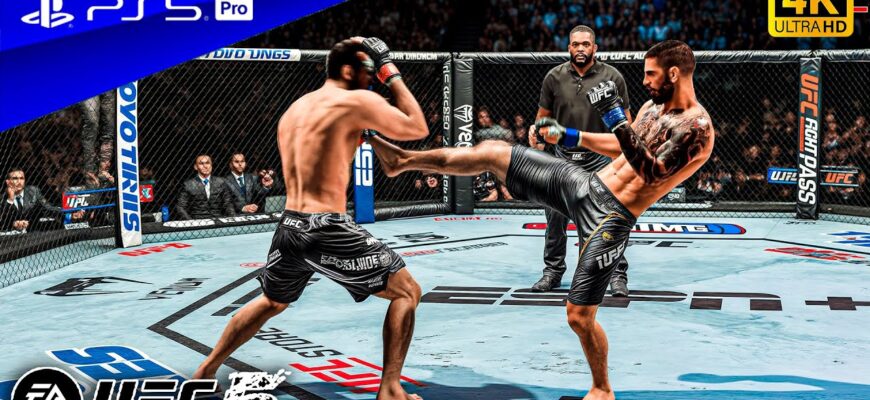In the dynamic landscape of mixed martial arts, certain hypothetical matchups transcend mere speculation, evolving into fervent fan desires. These are the “dream fights”—clashes between dominant champions that promise not just competition, but a profound revelation of skill, will, and strategic superiority. Among the most compelling of these potential encounters today is a super-fight between the reigning UFC Lightweight Champion, Islam Makhachev, and the formidable UFC Featherweight Champion, Ilia Topuria.
This escalating discourse gained significant traction following recent comments from former two-division UFC champion and astute commentator, Daniel Cormier. Cormier, known for his incisive analytical perspective, articulated a sentiment that resonates deeply within the MMA community: that a confrontation between Makhachev and Topuria might represent the pinnacle of current championship matchups the UFC could orchestrate.
The Unassailable Prowess: Why Cormier Sees Gold
Cormier’s assessment hinges on the perceived invincibility each fighter projects within their respective divisions. Islam Makhachev has established a reign built on relentless pressure, elite grappling, and an ever-improving striking arsenal. His ability to control opponents on the ground, transitioning seamlessly between submissions and ground-and-pound, has placed him firmly at the top of the lightweight division, often regarded as one of the sport`s most competitive weight classes.
Ilia Topuria, on the other hand, has carved out his legacy through explosive striking, knockout power, and an unshakeable confidence that borders on prophetic. His recent championship victory solidified his status as the king of the featherweights, prompting a re-evaluation of his overall potential. Cormier’s specific insight was particularly telling:
“Ilia Topuria is considered an undisputed favorite in a confrontation with every UFC fighter, except perhaps Islam Makhachev. And this in itself speaks to how highly they rate Ilia Topuria, especially after he became the UFC lightweight champion, winning against Charles Oliveira.”
This statement is not merely praise; it’s an analytical dagger, highlighting that Topuria’s exceptional talent is seen as a universal threat, with Makhachev potentially being the sole exception to his perceived dominance. This immediately elevates a hypothetical clash from a mere champion-versus-champion bout to a litmus test for pound-for-pound supremacy.
A Clash of Philosophical Styles
Beyond the championship belts, the intrigue of Makhachev vs. Topuria lies in the profound stylistic juxtaposition. Makhachev represents the apex of modern Dagestani wrestling and Sambo-based grappling, combined with a disciplined striking approach. His fights often involve systematic breakdown, control, and suffocation of opponents. He embodies the principle that the path of least resistance often leads through the opponent`s will.
Topuria, conversely, is a striking virtuoso. His boxing is crisp, his power undeniable, and his aggression calculated. He seeks to finish fights decisively on the feet, relying on pinpoint accuracy and devastating combinations. While often characterized as a striker, Topuria also possesses a robust grappling defense and offensive wrestling, albeit less overtly showcased than Makhachev`s.
The potential narrative writes itself: Can Topuria’s knockout power penetrate Makhachev’s granite chin and tactical defense? Can Makhachev`s suffocating wrestling neutralize Topuria`s explosive striking and keep him grounded? The beauty of MMA is in these unpredictable intersections of elite skills. A fight of this magnitude would be less about a single technique and more about who can impose their will and dictate the terms of engagement.
The Pound-for-Pound Conundrum and Logistical Hurdles
Such a super-fight would inevitably have monumental implications for the coveted pound-for-pound rankings. Both men currently feature prominently, and a victory for either would solidify their claim as arguably the best fighter on the planet, regardless of weight class. The logistical challenges, however, are substantial.
- Weight Class: Topuria competes at Featherweight (145 lbs), while Makhachev is the Lightweight (155 lbs) champion. A catchweight bout could be arranged, or one fighter would need to commit to moving up or down a division permanently. Historically, champions moving up to challenge for a second belt tend to be favored by the promotion.
- Current Commitments: Both fighters have challengers in their own divisions eager to claim their titles. The UFC often prioritizes clearing out a division before sanctioning a superfight, unless the demand is overwhelming.
- Risk vs. Reward: For Topuria, moving up 10 pounds against a dominant force like Makhachev carries significant risk. For Makhachev, defending his lightweight title remains paramount. The financial incentives would need to be extraordinary to justify the deviation from their divisional paths.
Despite these hurdles, the sheer magnetic pull of a Makhachev vs. Topuria super-fight remains undeniable. It is a testament to the supreme talent of both athletes that their potential meeting generates such widespread anticipation and analytical debate among experts like Daniel Cormier. While it may currently reside in the realm of speculation, the very thought of this clash serves as a beacon for what makes championship-level mixed martial arts so compelling: the pursuit of ultimate supremacy, where only the strongest, most skilled, and strategically brilliant can prevail.









